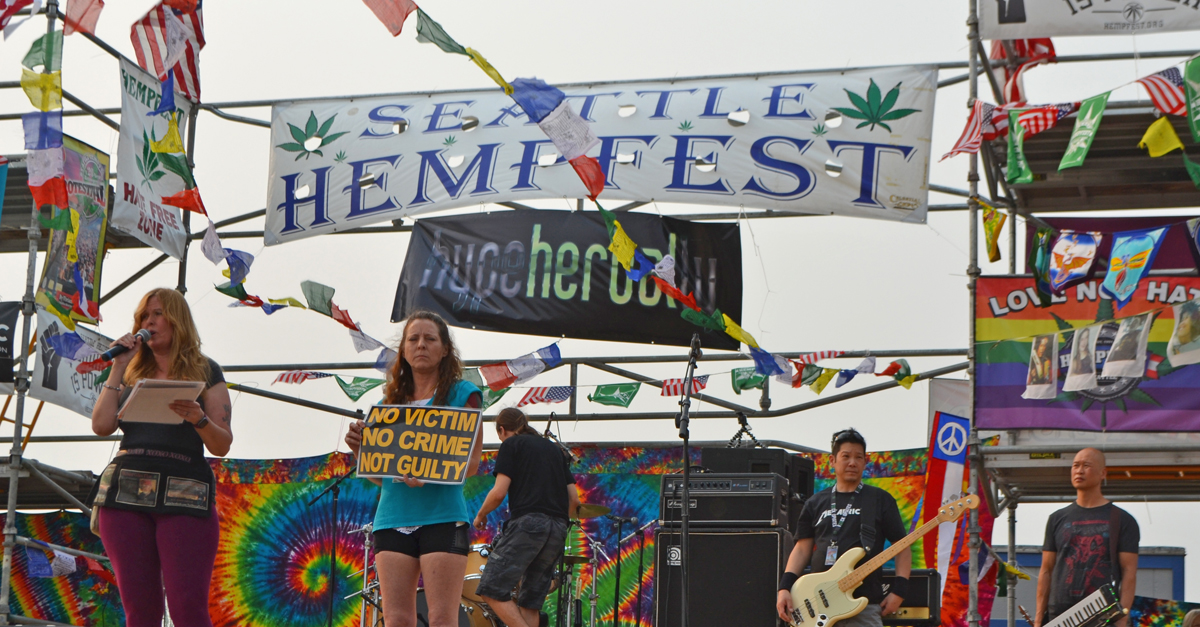Seattle Hempfest Fights for Right to Generate Revenue at ‘World’s Fair of Weed’

This article was originally posted on June 10. It has been updated.
Seattle Hempfest, which takes place August 16-18, is suing the state of Washington to overturn agency rules that may violate Constitutional guarantees of free speech.
“Public parks and public spaces are the modern equivalent of a town square,” Hempfest executive director Vivian McPeak tells Freedom Leaf. “That’s why they deserve the highest degree of protection. As a free speech event, nothing’s more important to us than political speech.”
Hempfest is held in Myrtle Edwards Park, a narrow tract of land that abuts the Puget Sound. At issue, is a recent rule change by Washington State Liquor and Cannabis Board (LCB) that impinges on Hempfest sponsors and vendors’ ability to promote, advertise and sell products at the event. It reads, in part:
“No marijuana licensee shall place or maintain, or cause to be placed or maintained, an advertisement of a marijuana business or marijuana product, including marijuana concentrates, useable marijuana or marijuana-infused product: (i) In any form or through any medium whatsoever within 1,000 feet (italics added) of the perimeter of a school grounds, playground, recreation center or facility, child care center, public park (italics added) or library.”
Seattle Hempfest is the World’s Fair of Weed featuring bands, speakers and hundreds of vendors, and admission is free.
McPeak adds, “On the LCB website, until last month, it said cannabis businesses can have informational displays at events like Hempfest. It named us. Then last month they took that language off of their website, and instead replaced it with this incredibly restrictive stuff saying that they can’t even have a presence. In other words, they can’t have their name, their logo, their address, any sign of any kind.”
Faced with the Suit, the LCB Attempts to Clarify
On June 26, the LCB clarified its position on advertising at events, now saying:
“Those restrictions apply to any signs or advertisements that are commercial in nature. On the other hand, the use of a business trade name on a booth, or identified as part of a sponsorship level that is non-commercial, would not constitute a violation of the statute. This would include identification of sponsors who are supportive of an advocacy event (such as Seattle Hempfest).”
“A clarification’s one way to look at it,” observes McPeak. “How about folding, going back on the previous situation, because that’s what they did?»
While the LCB’s move satisfies the injunction that Hempfest asked for in its lawsuit, McPeak insists. «The lawsuit’s going to stand until the legislature changes the law.”
The LCB suit is just one of the hassles Hempfest has endured this year. “We’re also in court with the City on things they’ve been trying to do to restrict various aspects of Hempfest, which we think are also free-speech violations,» he explains. «As Bob Marley sang (on ‘Buffalo Soldier’), ‘Fighting on arrival, fighting for survival’.”
Meanwhile, the alcohol industry has more flexibility in terms of marketing and promotion, thanks to the LCB not restricting them in the same way. “No outdoor advertising of liquor… shall be placed within 500 feet (italics added) of schools, places of worship, public playgrounds or athletic fields used primarily by minors… churches, public playgrounds or athletic fields,” another rule states. Note that parks are not included.
Beer and wine events are given much more leeway than cannabis events. For instance, beer and wine are sold and consumed at festival and tasting events, which are often held in public parks and spaces where children are allowed to enter. That’s generally not the case with cannabis events.
Executive Director Vivian McPeak: “This is a blow right to the heart of Hempfest’s revenue generation.”
Hempfest’s biggest supporters are businesses involved in the cannabis industry: growers, producers, weed shops, security and packaging companies, lifestyle magazines and a host of others. Their products, signs and promotional materials are seen by tens of thousands of attendees who flock to the event every August.
Some thought that once legalization went into full effect in Washington, Seattle Hempfest would just fade away. That hasn’t happened. If anything, post-legalization, Hempfest has become an even greater symbol of freedom and marijuana culture. It’s the World’s Fair of Weed featuring bands, speakers and hundreds of vendors, and admission is free. That may explain why Washington is trying to kill it off.
Though courts have determined that government has the power to regulate commercial speech, Hempfest appears to have solid legal standing. This isn’t just about the principle, however, it’s also about the historic event’s survival.
“This is a blow right to the heart of Hempfest’s revenue generation,” McPeak maintains. “It’s one of our primary sources of revenue. I mean, who’s going to advertise at Hempfest? Well, cannabis businesses. Who’s going to sponsor Hempfest? Cannabis businesses. Who’s going to have a vending booth? Some cannabis businesses. So, there’s very broad implications here. We just feel this is a pretty clear-cut case and we’ve got to fight the power.”
RELATED
Ngaio Bealum’s Guide to Surviving Seattle Hempfest
Gov. Jay Inslee Say Washington’s Weed Is ‘the Best’
Boston Freedom Rally: Three Days of Weed and Music

